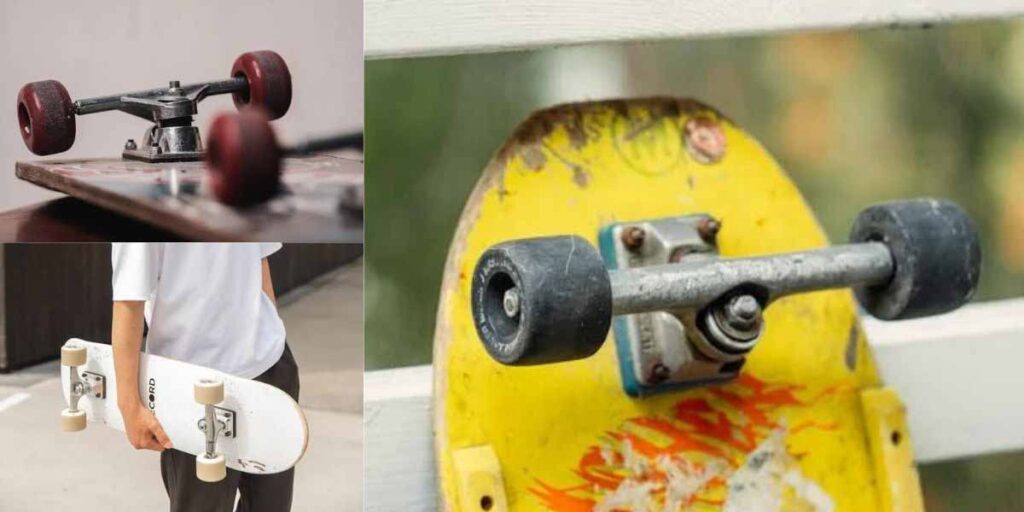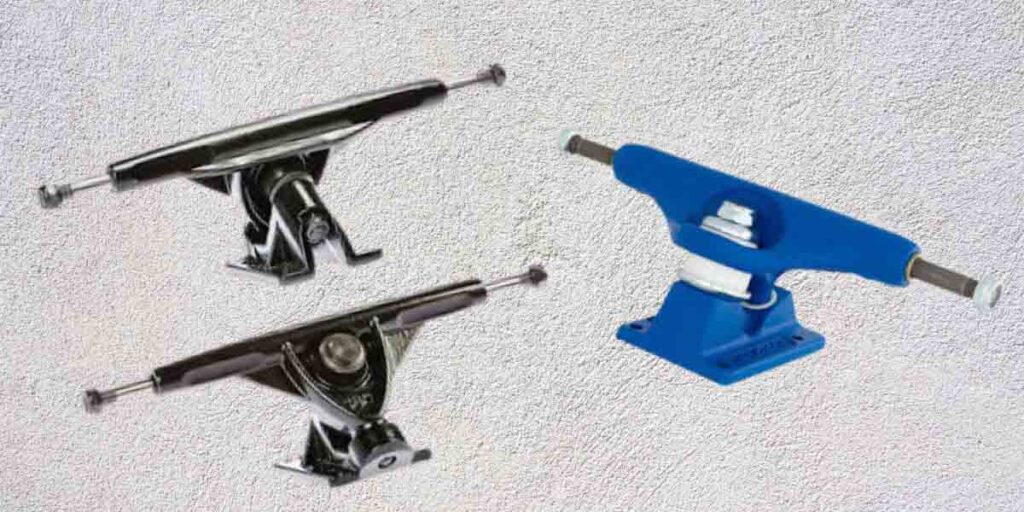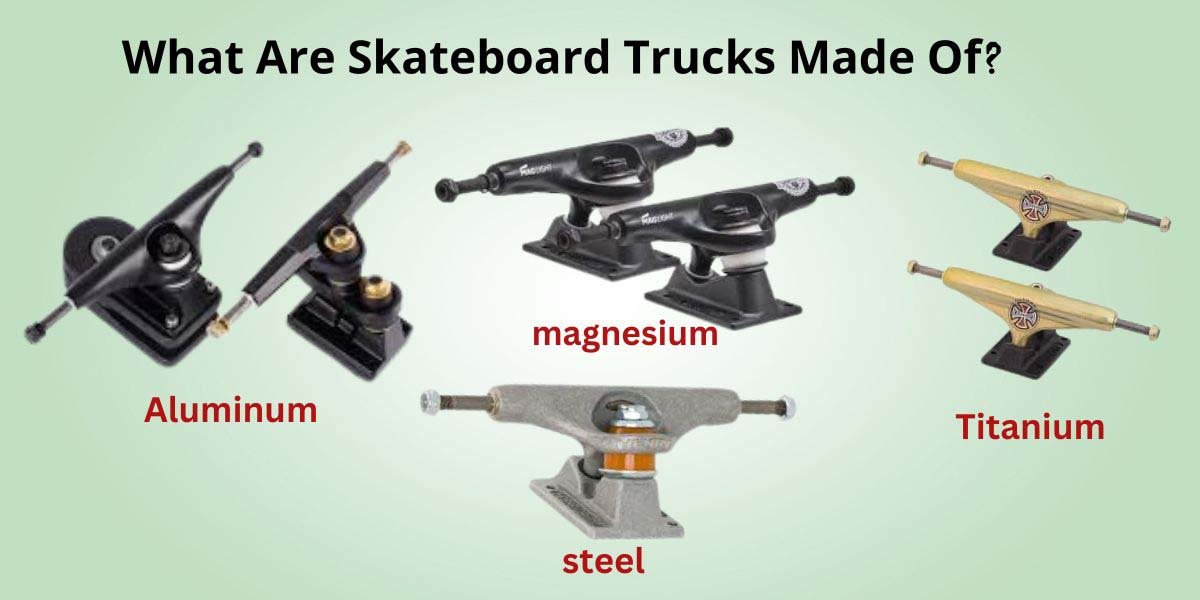Skateboard trucks are the backbone of any skateboard. They connect the deck to the wheels and play a crucial role in the performance. But what are skateboard trucks made of? Basically, most skateboard trucks are made from materials like aluminum alloys, steel, and sometimes even titanium or magnesium. These materials balance strengths, lightness, and durability which increase your ride. Now, we’ll break down everything you need to know about the materials used in skateboard trucks. Also, we will discuss how they impact your skating experience.
Whether you’re a beginner trying to understand your first setup or a pro skater looking to upgrade. This article will help you make an informed choice.
The Anatomy of a Skateboard Truck
- Baseplate: The baseplate is the part of the truck that attaches directly to the skateboard deck. It is typically made from aluminum. Choose for its balance of strength and weight. Some baseplates are also made from magnesium or titanium for higher performance.
- Hanger: The hanger is the T-shaped part that houses the axle and is also primarily made from aluminum. The hanger’s design and material significantly influence the truck’s overall weight and durability.
- Axle: Running through the hanger, the axle is a steel rod that extends to both sides to hold the wheels. Moreover, steel is used for its robustness and ability to withstand the forces of skateboarding.
- Kingpin: The kingpin is a large bolt that holds the truck components together and allows the truck to pivot. It is usually made from steel to ensure durability.
- Bushings: Bushings are made from polyurethane and sit around the kingpin. They provide the cushioning that allows the trucks to turn smoothly. It can be adjusted for different levels of responsiveness.
- Pivot Cup: The pivot cup is a small urethane part that fits into the baseplate and allows the hanger to pivot. It provides smooth turning and reduces friction.
What Materials Are Used in Skateboard Trucks?

Skateboard trucks are typically made from the following materials:
Aluminum
Aluminum is the most common material used in skateboard trucks due to its excellent balance of weight and strength. It provides precision in tricks and stunts. it’s also durable enough to handle the stress and impact of skateboarding.
Pros:
- Lightweight: Easy to carry and maneuver.
- Durable: Resists rust and corrosion, making it long-lasting.
- Affordable: More budget-friendly compared to other materials.
Cons:
- Can Crack Under Extreme Pressure: Aluminum is durable but can crack under extreme forces, especially during intense tricks.
Steel
Steel is primarily used for the axles and kingpins of skateboard trucks. Its high tensile strength makes it perfect for these components. They need to withstand significant forces and impacts.
Pros:
- Extremely Durable: Handles heavy impacts well.
- Strong: Ideal for skaters who do a lot of grinding or tricks.
- Resistant to Wear: Lasts longer than many other materials.
Cons:
- Heavier: Adds weight to the skateboard, which may affect performance.
- Prone to Rust: Needs proper care to avoid rusting, especially in humid conditions.
Titanium
Titanium is less common but valued for its incredible strength-to-weight ratio. It’s a premium material often chosen by skaters. They seek the best performance with minimal weight.
Pros:
- Lightweight: One of the lightest materials available.
- Strong: Stronger than aluminum, offering better performance.
- Corrosion-Resistant: Doesn’t rust, even in damp conditions.
Cons:
- Expensive: Much pricier than aluminum or steel.
- Less Common: Not as widely available, making it harder to find.
Magnesium
Magnesium is another material used in premium skateboard trucks. It is even lighter than aluminum and offers excellent performance. But it is more expensive and less common.
Pros:
- Ultra-Lightweight: Significantly reduces the weight of the skateboard.
- Strong: Provides good strength without the heaviness.
Cons:
- Expensive: Costs more than aluminum, similar to titanium.
- Less Durable Than Steel: Not as strong as steel, so it may wear down faster.
Polyurethane
Polyurethane is used for the bushings and pivot cups. This material provides the flexibility and resilience needed for smooth turns and shock absorption.
Why Material Choice Matters
Durability
The choice of materials directly impacts the durability of skateboard trucks. Aluminum and steel provide the necessary strength to withstand the rough conditions of skateboarding.
Weight
Lighter materials like aluminum, titanium, and magnesium reduce the overall weight of the skateboard. This makes it easier to perform tricks and maneuvers.
Performance
Different materials affect the performance of skateboard trucks. For instance, titanium trucks offer a higher performance level but come at a higher price.
How Are Skateboard Trucks Manufactured?
Casting
Most skateboard trucks are made using a casting process where molten aluminum is poured into molds. This process is cost-effective and produces durable trucks.
Forging
Forged trucks are made by pressing aluminum into shape under high pressure. This process creates stronger and lighter trucks but is more expensive.
Precision Machining
High-end trucks may be precision machined from a single block of aluminum or titanium. This process ensures the highest level of performance and durability but comes at a premium price.
Choosing the Right Skateboard Truck Material

With so many options available, how do you choose the right material for your skateboard trucks? Here are some tips:
Skating Style Considerations
- If You’re Into Technical Tricks: Go for lightweight trucks made from aluminum or magnesium.
- If You’re a Vert Skater: Choose stronger, more durable materials like steel or aluminum to handle the higher impact.
- If You Cruise: Focus on comfort and durability; aluminum or steel should work well.
Budget Considerations
- Entry-Level Skaters: Aluminum trucks offer the best value for money.
- Advanced Skaters: Investing in titanium or magnesium may improve your performance.
Personal Preference
Some skaters prefer the feel of certain materials over others. The best way to know what works for you is to try different setups. If possible, test skateboards with various trucks to find what feels right.
Future Trends in Skateboard Truck Materials
As technology advances, we’re likely to see new materials and innovations in skateboard trucks. Here are some trends to watch:
Innovations in Materials
- Carbon Fiber: Already used in some high-end decks, carbon fiber might soon be incorporated into truck designs. This would offer a blend of strength and lightness.
- Advanced Alloys: New metal alloys could offer even better performance, balancing strength, weight, and cost.
Sustainable Materials
- Eco-Friendly Options: With a growing focus on sustainability, we might see more skateboard trucks made from recycled or eco-friendly materials. This shift could help reduce the environmental impact of production.
Conclusion
Knowing what skateboard trucks are made of can significantly impact your skating experience. Whether you choose aluminum for its balance, steel for its strength, or titanium for its lightness, the material of your trucks is important. It affects how your skateboard performs.
Remember to consider your skating style, budget, and personal preferences when selecting your trucks. And don’t forget to maintain them regularly to ensure they last longer and perform at their best.
FAQs
Are Aluminum Trucks Better Than Steel?
Aluminum trucks are generally preferred for their lightweight properties. On the other hand, steel is used for components that need extra strength such as axles and kingpins. The combination of both materials offers a balanced performance.
What Are the Benefits of Titanium Trucks?
Titanium trucks are incredibly lightweight and strong. They offer excellent performance but come at a higher cost compared to aluminum and steel.
Can I use skateboard trucks made from different materials?
Yes, many skateboard trucks use a mix of materials. They often have aluminum for the hanger and baseplate, steel for the axles, and polyurethane for the bushings.
How do I choose the right skateboard truck for my needs?
Consider factors like your skateboarding style, weight preference, and budget. Lighter trucks are better for tricks. On the other hand, heavier trucks offer more stability for cruising.
Do high-end materials like titanium make a significant difference?
High-end materials like titanium offer a performance edge in terms of weight and strength. However, they are more expensive and may not be necessary for beginner or casual skaters.

